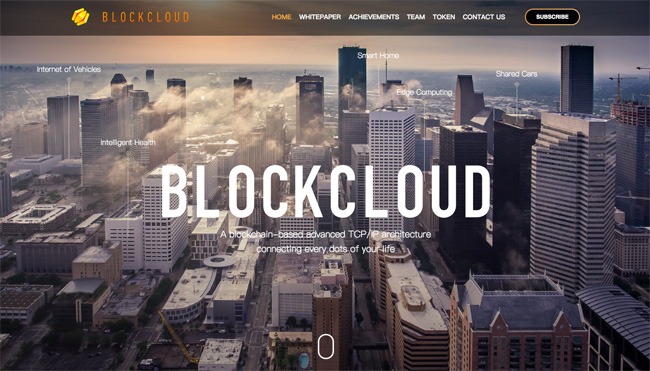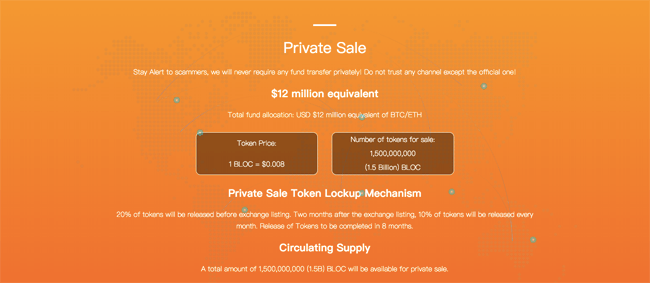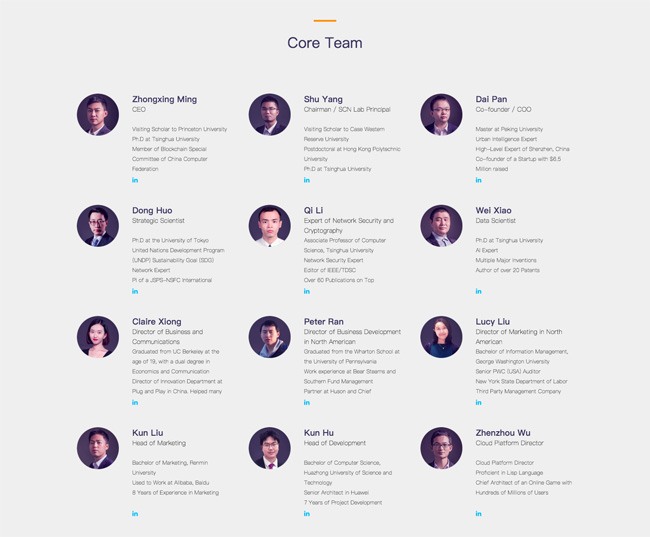Blockcloud is an upcoming “blockchain-based TCP/IP architecture” which aims to bring together blockchain technology with service-centric networking (SCN) in order to power internet of things (IoT) solutions like never before.
The project, which has been created by a team of Chinese academics, is going to focus on a highly-mobile blockchain solution that is not restricted to clunky and heavy blockchain platforms and which instead operates as a layer solution so that it does not fall prey to the scalability issues that so many other blockchains are currently facing with an increased user base.
The project is certainly an ambitious one, there are quite a few competitors in this industry as this is a field that is also up and coming. There are potential threats from centralized solutions as well who would like to step in and play a role in this market.
Having said all that Blockloud does have a chance as it is seeking to enter into growing sector that will certainly play a significant role in society.
Let’s take a look at the market opportunity.
Blockcloud ICO Review: Market Opportunity
The Internet of Things is an industry that matters. According to the whitepaper offered by the Blockcloud team, there will be an estimated 20 Billion devices by the year 2022, the Internet of Things will become an important part of the key aspect of accessibility. As more technologies come about (smart healthcare, augmented reality, autonomous vehicles and, others) the world becomes an increasingly device oriented place.
But they are realizing that there is a prominent problem in being able to have a streamlined and connected future, a poor IoT architecture.
The team at BlockCloud is focused on simplifying and solving on major issues that are plaguing the Internet of Things sector today, they want to eliminate “frail connectivity, poor scalability, absent trust, cracked security and broken business models.” They are essentially looking at the bigger picture and seeing that many things are awry in this sector at large.
The BlockCloud team has seen different solutions that were presented, the problem is that these solutions are scattered, they don’t solve the problem in a comprehensive manner. Their solution is to combine Service-Centric Networking (SCN) with the blockchain to propel mobility, scalability, security, and trust and bring about a pricing model that will fairly distribute profits to market participants.
There is an important note to make with Blockcloud, they state that the blockchain will only help with the applications layer of their solution while SCN technology will be used for the underlying architecture. This venture certainly carries with a lot of risks, they are combining technologies that have not been aligned before to create a comprehensive solution.
The Blockcloud solution is comprised of five components, a layered that structure which will be allocated for blockchain integration, Service Access layer for communication needs, proof-of-service for the verification of servicers on the network, and a Compacted Directed Acyclic Graph (CoDAG) mechanism to make a log of transactions and finally, a pricing mechanism called Truthful continuous double auction to account for fair distribution of services.
As is the case with most successful projects, they are designing their project to be compatible with the present while catering to the near future.
They understand that incentives are important and have incorporated this into their design.
The Blockcloud solution will focus on its new “Proof of Service” consensus, which will allow it to resolve transactions on the blockchain by simply having relevant IoT devices communicate with each other. It also aims to keep the verifying environment clean and mentions that it will penalize any unsavory participants by restricting them from the network.
As a layer-based solution, Blockcloud will be adding various functionalities to its portfolio which are otherwise not offered by the blockchain platforms that are currently available for everyone to use.
Due to its capabilities to run multi-level solutions all at once, the platform plans to introduce Internet of Vehicles, a solution to communicate between smart cars; Smart Health, a system to enhance the delivery of health-centric services through IoT devices; Smart Home, an overall functionality that could power any home with the capabilities of blockchain; Edge Computing, which will enhance the current level of connectivity between computing devices; and Sharing Economy, which will aim to create a trustless, decentralized ecosystem throughout this internet-based blockchain solution.
They integrated their pricing mechanism because they aim to have an incorporation of a marketplace which will have service providers and those who want to utilize the services as well.
This marketplace will certainly be a component as more companies will want to access data from the network and contribute other services as well. If Blockcloud is able to tackle the underlying infrastructure and then build on top of that by adding application layers with applications like their marketplace it could certainly have immense potential.
By serving up a solution that will act as the underlying foundation, Blockcloud can provide a key value while being the cornerstone of the future. As more entities are able to tap into their solution, more can be empowered. The solution that Blockcloud provides caters to IoT and not IoT services for the Internet.
Since the solution claims to be a blockchain that runs on internet/cloud, it could be accessed by virtually anyone in the world without them having to set up costly machines just so they could access Blockcloud’s blockchain network.
Furthermore, the way that Blockcloud aims to enhance the integration of IoT within blockchain and take these devices into the next generation of computing also sounds promising and actually believable to an extent due to how the project describes its functions in the detailed whitepaper.
With these clearly defined approaches, Blockcloud aims to become the go-to solution for the owners of several devices and operating systems so that the world could leverage the functionalities of blockchain technology without the everyday user feeling like the technology would be out of reach for their conventional computer user’s mind.
It certainly does seem like they have a clear-headed approach in how they will be addressing the problems that plague IoT today.
Blockcloud ICO Review: The Crowdsale
The platform aims to create a market cap of $80 million where it would be aiming to raise $15 million through fundraising.
However, unlike other coins, Blockcloud aims to raise the majority of its funds through private sale instead of a public offering, with a goal of $12 million to be fetched through investors in a private sale.
In the private sale, the platform will be selling 1.5 billion of its BLOC coins, which it has appraised at $0.008 apiece.
According to the Blockcloud website, the platform will release 20% of its tokens before its exchange listing. Two months after the BLOC coins have been released to exchanges, the platform will start releasing 10% of its tokens each month, continuing the practice for a total of 8 months.
The dates for the private or public sale have not been announced yet, but the platform does mention that apart from selling off 15% of its token supply in a private sale, it will have 5% available for “other sale”.
Token Distribution
Private Sale: 15%
Other Sale: 5%
Early Contributor Incentive: 10%
Foundation: 30%
Team: 10%
Mining Rewards: 30%
According to the Blockcloud platform, it will release its mining rewards at a rate of 5% per year, for up to 6 years.
The token will be useful in the incentivization aspect of the network, it will help to bring in service providers (who will be rewarded for their contributions to the network), the BLOC token will be instrumental in rewards to contributors and miners and verifiers alike.
Team
The team behind Blockcloud is largely comprised of academics from Tsinghua University, Shenzhen University, and the Hong Kong Polytechnic University.
While the individuals may not be as prominent as other people in the blockchain sector at this point, they might be on the rise. The platform’s website has a dedicated team page providing concise introductions for each of its team members which include Zhongxing Ming, Mingwei Xu, Qi Li and Ke Xu from Tsinghua University; Shu Yang and Laizhong Cui from Shenzhen University; and Dan Wang from the Hong Kong Polytechnic University.
They certainly have the knowledge, many of the team members are authors of more than 45 academic pieces of literature, additionally, various team members have backgrounds with prominent Chinese internet companies such as Baidu and Tencent.
The team boasts of deep experience in the IoT industry for ten years catered to technologies such as the Internet of Vehicles, Smart Health, and Smart Home and they have partnered with organizations like Partner of China Association of Automobile Manufacturers, and National Key R&D Program of China.
Several of the key team members are associated with Oudmon, the parent company of the project. Oudmon has been around since 2014 and has an excess of 100 clients, 1 million users and has created more than ten billion dollars worth of value.
They have business advisors from prominent places such as Roger Lim from capital firm NEO Global Capital, Hoan Soon Lee and advisor to the Obama Administration and Alex Likhtenstein who has associations with Charlie Shrem and other prominent members in the blockchain sector.
The team, at first seems as if they only have experience in the academic domain but they certainly have business expertise as well.
Blockcloud ICO Review: Opinion
Blockcloud is one of the most recent solutions that claim to resolve the scalability issues and other issues that are suppressing the substantial growth of the IoT sector, if they can pull it off they will be able to unlock a lot of value.
If the past is an indicator of the future then this team should be a strong bet, key members of the team were top movers in Oudmon and will be able to bring that skill set and tenacity to this project as well.
In addition, they will be able to utilize their relationships and credibility in both academia and business fields to bring on board clientele who can serve as providers and consumers in their network.
Yet, before we make a final call, let us search a little further. There is a lot of question at play here, let’s first take a look at the weaknesses and the competition.
Weaknesses
The project has a whitepaper but it seems that we don’t have great details on their roadmap, in addition to this, it seems that we will only see progress in regard to their minimum viable product in the in middle of next year. Many investors may not have the patience to wait that long to see if the team show proof of product.
Furthermore, as noted above this is not a tried and true approach, investors will be taking a big risk on the amalgamation of two brand new technologies.
But Blockcloud looks like it has a great approach to tackling this gargantuan effort, they will break it down piece by piece, layer by layer until they fulfill their vision.
From an immediacy standpoint, their timeline may seem long but from a big picture standpoint, and going in line with the IoT industry they look like they are on track.
Competition
In regard to the competition factor, there may not be other significant external threats and competition from companies in the blockchain space, but there are a slew of competitors in the centralized space.
Prominent companies that one should watch out for that may pose a threat in the centralized sector are Google and others.
The blockchain based space for crypto definitely has parties that are tackling different aspects of the system but there doesn’t seem to be anyone who is competing directly in the specific space that BlockCloud is looking at.
Still, it would help to point out a significant player in the IoT crypto market.
IOTA is focused on creating an IoT based data sharing marketplace but that’s a different roadmap.
The foundation at IOTA states that their vision is to “enable all connected devices through verification of truth and transactional settlements which incentivize devices to make available its properties and data in real time. This gives birth to entirely new general purpose applications and value chains.”
This means that there must be aspects of crossover into Blockcloud and its own verticals but how much of a crossover initially? If Blockcloud wants to be the foundational layer than this means that IOTA should be able to build on top of it.
IOTA is taking action and making progress from a partnership standpoint as they work with many prominent companies and seem to be signing up more per day.
It is unclear at the moment if IOTA is also vying for this foundational spot.
Threat Level – Medium
Another threat which Blockloud would encounter is that of a substitute to their foundational solution. Will the market choose the underlying solution that they are offering or will they choose another?
There were several telecom protocols that could have been the underlying infrastructure of the Internet, but TCP/IP won out and that too because of a declaration by a significant authority.
“In March of 1982, The U.S. Department of Defense made a statement declaring TCP/IP as the protocol standard for all military computer networking—a huge shot in the arm for the overall implementation” according to Colocation America.
Yet, the team is aware of potential substitutes and is thus directly associated with one of the national ISP’s in China – CERNET, as well as the world’s largest next generation Internet – CERNET 2.
The head of CERNET/CERNET 2 is the advisor of advisors of the Blockcloud team, and the core members of Blockckloud team are the members CERNET/CERNET 2.
In addition to this, they are also active members of IETF, an organization which represents the Standardization Organization of the Internet, according to their community manager.
Blockcloud ICO Review: Conclusion
However, from what is seen of the team’s work through the proposed solutions, it seems that Blockcloud has the potential to revolutionize the IoT industry and progress further.
The team seems to have looked every angle and considered the many possibilities in this sector and have addressed to them the best of their ability.
It just remains to be seen if the team would continue on the same proficient path that it has set for itself.
At the very least place this project on your watchlist, they have a compelling team, they’ve got the experience, the knowledge and it looks like they are committed.


